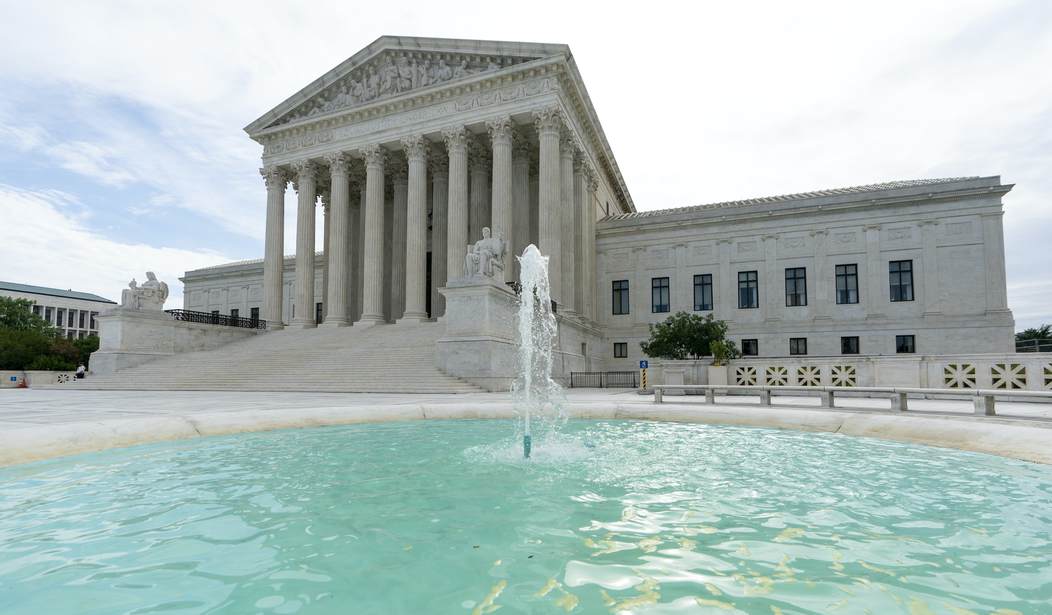
The Fifth Circuit Court of Appeals today blocked an Order by a federal district court judge telling Texas it must implement his rewritten process for matching signatures on absentee ballots. The Judge gave county election officials the option of not rejecting ballots at all for mismatch signatures if they did not want to follow the procedures for rejecting ballots laid out by him in his order.
U.S. District Court Judge Orlando L. Garcia, who was appointed by Pres. Clinton — naturally — on September 8, 2020, issued a 103 page order that re-wrote significant features of the Texas absentee voting statute.
This case was not initiated by Democrat Party groups in response to complications created by COVID-19. The complaint was actually filed in September 2019, but it took Judge Garcia until September 8, 2020, to issue a ruling on motions for summary judgment brought by each side back in June.
The Order granting relief was filed on September 8. Texas filed a Notice of Appeal to the Fifth Circuit on September 9, along with a motion to stay the Order’s effect on the same day. Judge Garcia denied the motion to stay on September 10, so Texas sought an emergency stay from the Appeals Court.
Today the Fifth Circuit granted the stay pending the outcome of Texas’ appeal, which will take place long after the Nov. 3 election is over.
In a well-intentioned but sweeping order issued less than two months before the election, however, the district court minimizes Texas’s interest in preserving the integrity of its elections and takes it upon itself to rewrite the Legislature’s mail-in ballot signature-verification and voter-notification procedures. At a time when the need to ensure election security is at its zenith, the district court orders that, if the Secretary of State does not adopt its preferred procedures, election officials must stop altogether rejecting ballots with mismatched signatures.
At issue is the requirement in the Texas statute that, before an absentee ballot can be counted, an Election Official must compare the signature on the Absentee Ballot Request form with the signature on the ballot security envelope into which the voter places the ballot and then signs. If the signatures match then the vote is counted. An initial determination is made by a single election office worker. If the worker determines the signatures do not match, the ballot is sent to an oversight board. The board makes an independent determination regarding whether the signatures match; a majority vote of the board decides whether the vote is to be counted or the ballot rejected.
The voter is notified in writing if the ballot was disallowed, but this notice does not need to come before the election. Texas law does not provide for any opportunity for the voter to “cure” the signature defect, and to then have the ballot counted.
The district court’s Order required the Texas elections officials to take three steps immediately:
First, the court required the Secretary to issue an advisory, within ten days, notifying local election officials of the injunction…. The notification must inform them that rejecting ballots because of mismatching signatures is unconstitutional unless the officials take actions that go beyond those required by state law…
Second, the district court gave the Secretary a menu of actions that she must take. The Secretary must either issue an advisory to local election officials requiring them to follow the court’s newly devised signature verification and voter-notification procedures, or else promulgate an advisory requiring that officials cease rejecting ballots with mismatched signatures altogether…
Third, the court mandated that the Secretary take action against any election officials who fail to comply with the district court’s newly minted procedures… Deeming those dictates “appropriate for the November 2020 elections,” the court stated that it would hold a hearing after the election to consider imposing additional long-term election procedures…
In addition, the district court altered the process for rejecting a ballot based on mismatched signatures. The process to be imposed was going to be so burdensome that it would have by necessity required the Texas county election officials to opt to not reject ballots for mismatched signatures at all — which was the alternative that Judge Garcia provided for counties who didn’t want to follow his direction. The Judge’s order required the following procedures to be followed — rather than the procedures set forth in the Texas statute:
i. Before rejecting a ballot on the basis of a perceived signature mismatch, any [Elections officials] must compare the signatures on the voter’s application and carrier envelope with all other signatures from the prior six years that are on file with the county clerk or voter registrar so that the [Elections official] can “confirm” its initial determination that a ballot should be rejected.
ii. Voters whose signatures are perceived to be mismatching following the comparison … must be mailed notice of a rejected ballot within one day of the [Elections official] rejection determination, and notice must (a) advise the voter that – in the event the voter believes his or her ballot was improperly rejected – the voter may seek relief by contacting an appropriate election official and (b) provide the appropriate election official’s telephone number and mailing address.
iii. In the event a voter whose signatures are perceived to be mismatching provided his or her telephone number … the election officials must make at least one phone call attempt to that number within one day of the [Elections official] rejection determination …
iv. In the event any voter notifies the appropriate local election official(s) that his or her ballot was improperly rejected based on a perceived signature mismatch or claims that he or she signed both the application and the carrier envelope, the appropriate county election officer must pursue a challenge on behalf of the voter… unless the voter explicitly informs the county elections officer that he or she does not wish for the official to pursue relief on the voter’s behalf.
The emphasis I have included is in the Court’s original order.
Understand that there are large swaths of the legal community across the country that APPLAUD orders like this coming from liberal judges. They look at a voting system established by a state legislature, and simply deem it in need of rewriting by the Judge in his Solomonic wisdom in order to address perceived flaws. Those same pundits then lament when an appeals court comes along and says “Maybe it’s not the job of the district court judges to rewrite statutory provisions.”
The Appeals Court blocked the order, and Texas will follow the signature matching procedure set forth in the statute. But the decision today, if left to stand — and then built upon by other decisions in other courts — is going to send shock waves through the activist legal community because of some of the “markers” it lays down. Language in the decision paves the way for the Fifth Circuit to ultimately find that while “the right to vote” is constitutionally protected, the right to vote “in a particular fashion” or in the most convenient manner, are not covered by the same constitutional protections. Such a holding would curtail much of the effort by liberal judges to rewrite state voting statutes on the basis that the procedures sanctioned by a state are constitutionally unsound.
I’m going to come back to some of these passages in another piece, discussing the implications of some of the language. But at this point I just want to quote the opinion. Keep in mind that the issue — so far as liberal activist judges are concerned — is the fundamental constitutional “right to vote,” words that appear nowhere in the Constitution. Consider the following against that backdrop:
We must first determine whether the plaintiffs have alleged any cognizable interests that warrant due process analysis. They have not.
The plaintiffs bring procedural due process claims, which require two inquiries: (1) “whether there exists a liberty or property interest which has been interfered with by the State” and (2) “whether the procedures attendant upon that deprivation were constitutionally sufficient.” …. Because the plaintiffs “invoke [the Due Process Clause’s] procedural protection,” they had the burden in the district court of establishing a cognizable liberty or property interest…. The Fourteenth Amendment says that states may not “deprive any person of life, liberty, or property, without due process of law.” In its conscientious 103-page order, the district court didn’t cite the Fourteenth Amendment—the sole constitutional provision it purported to interpret on the merits—even once. It’s no surprise, then, that the court also failed to identify the category of interest—life, liberty, or property—at stake in the right to vote. The plaintiffs’ brief is similarly silent. And this court has never squarely addressed the issue.
It is important, however, to identify a cognizable interest under the Due Process Clause, because we often dismiss due process claims where plaintiffs fail to identify a cognizable interest and because “[t]he types of interests . . . for Fourteenth Amendment purposes are not unlimited.”… No protection of life is raised, so we examine property and liberty interests.
Property interests “are not created by the Constitution.”… Instead, they “are created and their dimensions are defined by existing rules or understandings that stem from an independent source such as state law.”… We have found no court that has held that the right to vote—much less the alleged right to vote by mail—is a property interest….
Several district courts have concluded that the right to vote is a liberty interest…. Liberty interests arise from either “the Constitution itself, by reason of guarantees implicit in the word liberty,” or from “an expectation or interest created by state laws or policies.”…
Liberty interests that arise from the Constitution extend beyond “freedom from bodily restraint.”… They also include the right to contract, to engage in “the common occupations of life,” to gain
“useful knowledge,” to marry and establish a home to bring up children, to worship God, and to enjoy “those privileges long recognized . . . as essential to the orderly pursuit of happiness of free men.”On the other hand, state-created liberty interests are “generally limited to freedom from restraint . . . .” This is “a narrow category of state-created liberty interests.”… The plaintiffs cite no circuit precedent suggesting that state-created liberty interests exist outside the context of bodily confinement. There are two problems with describing the right to vote as a liberty interest. First, the district court styled it as a state-created interest, concluding that, because “Texas has created a mail-in ballot regime,” it must now provide “due process protections.” But precedent demonstrates that state-created liberty interests are limited to particular sorts of freedom from restraint… And the plaintiffs cite no binding authority indicating that state-created liberty interests exist outside the context of bodily confinement. Thus, the Secretary is likely to show that voting does not implicate any state-created liberty interest under the Due Process Clause.
The importance of this language is that the Court is leading to an outcome where there is a constitutionally protected “right to vote” as a liberty interest that arises from the Constitution, but there is no “state-created” constitutionally protected liberty interest in “the right to vote a certain way” — such as by mail or absentee ballot.
This “right to vote a certain way” liberty, or “right to vote in the most convenient manner” liberty is the claim at the heart of all the election law challenges which have led liberal judges to rewrite statutes and procedures in ways they deem fit, based on the finding that the laws, as they exist, violate the voters’ constitutional right to vote. If the constitutional interpretation takes hold that the “right to vote” is protected by the Fourteenth Amendment, but not the “right to vote in a certain way”, then much of the litigation that has been commenced will melt away.
More later.














Join the conversation as a VIP Member